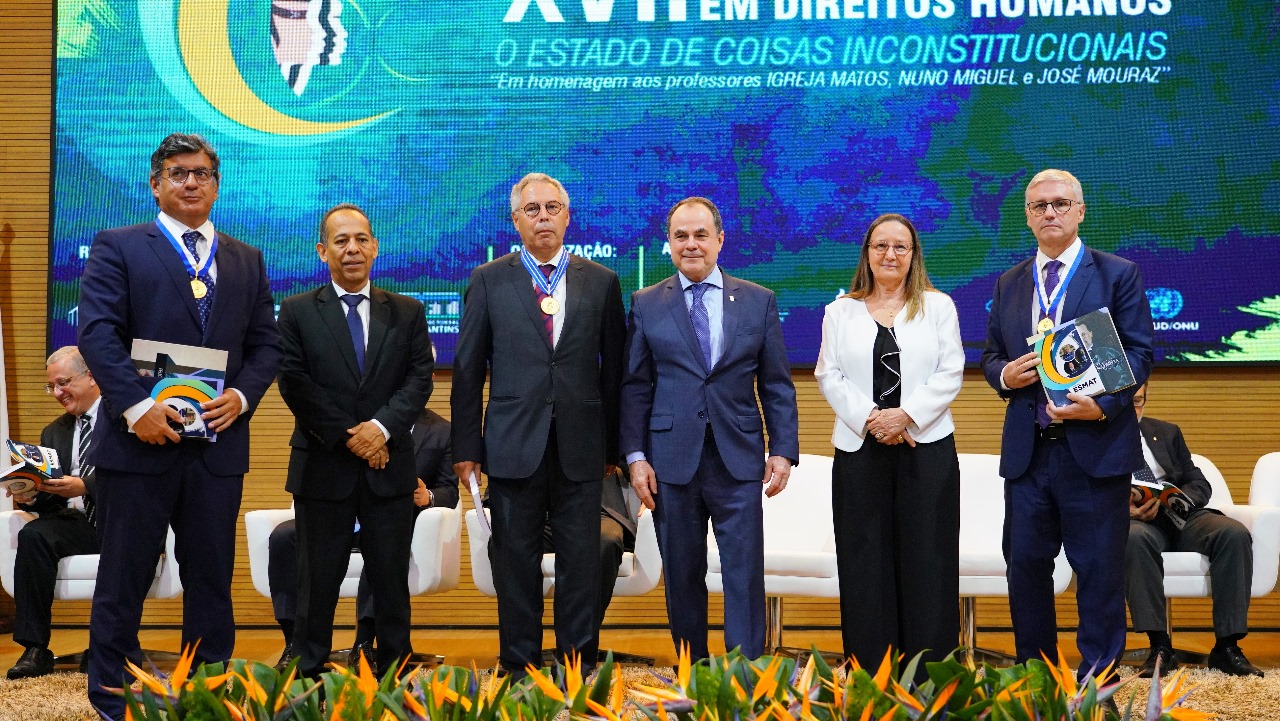
The opening of the 17th International Congress on Human Rights was attended by Justice Maysa Vendramini Rosal and Justice João Rodrigues Filho, who was sworn in last month. The event, promoted by the Superior School of the Judges of the State of Tocantins (Esmat) in partnership with the Federal University of the State of Tocantins, has as its central theme on “The State of Unconstitutional Things” and takes place at the Court of Justice of the State of Tocantins and includes activities at Esmat. Both magistrates stressed the importance of the Congress in strengthening the dialogue on human rights and the crucial role of the Judiciary in defending and promoting constitutional guarantees.
In her speech, Chief Maysa Vendramini highlighted the need to reflect on the effectiveness of fundamental rights in the lives of citizens and the importance of combating any form of human rights violation.
“Together we need to look for mechanisms to combat any situation that violates the rights of the human person, which goes against our Constitution,” she said, stressing the role of the judiciary as a true instrument of social transformation.
Justice João Rodrigues Filho, who recently took up a seat on the Court of Justice for the Public Prosecutor's Office, emphasized his commitment to his new mission and praised the value of teamwork in promoting faster and more effective justice. “Holding another International Congress on Human Rights emphasizes the search for social transformation through dialogue, academic training and valuing the fundamental rights of everyone. Spaces like these that bring the judiciary closer to the academic community in the search for improvements to the entire justice system,” he said.
In his opening speech, General Director of Esmat, Justice Marco Villas Boas, drew on the discussions of the National Council of Justice (CNJ) in order to put into practice a more humanized penal execution to welcome the speakers, scholars and participants of the Congress. “We have, of course, broadened the discussion on the subject because there is not only a recognition of a State of Unconstitutional Things in relation solely and exclusively to the prison issue. The State of Unconstitutional Things is present in Brazilian society and it is a struggle for all of us to overcome the disorder, in favor of an effective constitutional order that guarantees fundamental rights and promotes the well-being of all,” he said.
The Justice also pointed out, within this same concept, the massive violation of fundamental rights, such as criminal fires, deforestation in the Amazon, disrespect for indigenous peoples, women and children and adolescents. “These are situations of massive violations that need attention and repair,” he said, explaining that the concept of the State of Unconstitutional Things (ECI) was created by the Colombian Constitutional Court and declared when the Court is faced with a situation of massive and widespread violation of fundamental rights that affects a large number of people.
Congress
The opening of the congress also featured panel discussions on challenges related to massive violations of fundamental rights, such as criminal burning and deforestation in the Amazon, as well as issues of great social impact, such as mass incarceration. These debates will be the focus of activities until the closing of the event on October 4th.
To access the programming, click here.




_thumbnail_thumbnail.jpeg)
_thumbnail_thumbnail.jpeg)
_thumbnail_thumbnail.jpeg)
_thumbnail_thumbnail.jpeg)
_thumbnail.jpeg)
_thumbnail.jpeg)
_thumbnail.jpeg)
_thumbnail.jpeg)
